Crime in China
The Real Deal: Xinjiang Anti-Drug Campaign Video Goes Viral
Some people suggest the actor in Xinjiang’s latest anti-drug video campaign deserves an Oscar for his drug dealer role.
Published
3 years agoon
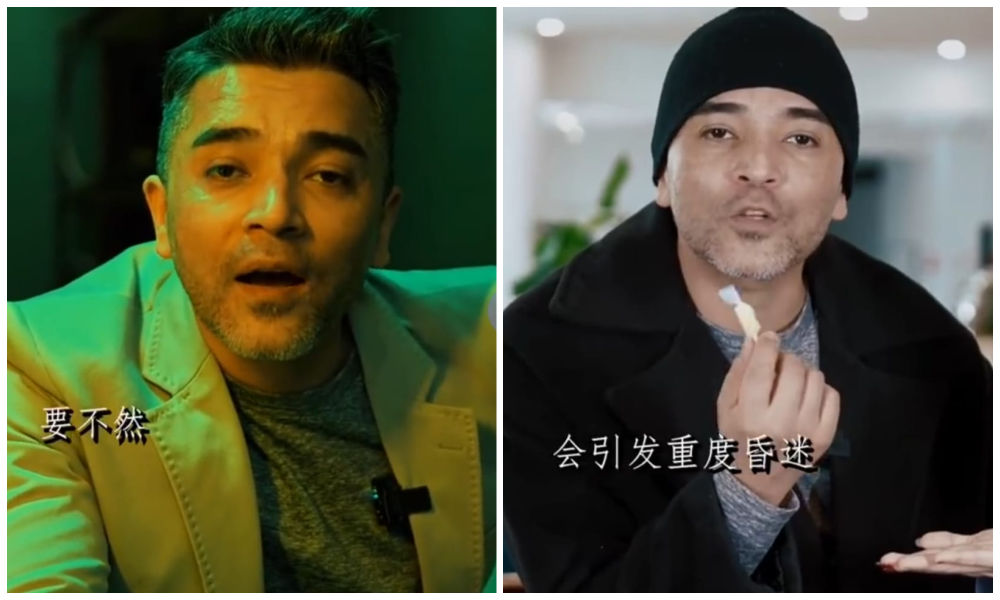
An anti-drug campaign released by Xinjiang authorities has become a trending topic on Chinese social media after different major Chinese official media outlets such as People’s Daily posted the video on their social channels.
One of the main reasons why the video has gone trending is not because of the strong anti-drug message it conveys, but due to the acting skills of the featured anti-drug ambassador. Many people say they would immediately believe he truly is a drug dealer.
Some people actually think he is so convincing as a drug dealer, that he is less convincing as an actual anti-drug ambassador.
“He’s a better actor than many actors we know,” some said, with others praising the ‘drug-dealer’ actor for having “such temperament, such aura.”
One hashtag related to the video, initiated by the Sichuan media account Sichan Guancha (@四川观察), is titled “Xinjiang Anti-Drug Ambassador Doesn’t Look Like [He’s] Acting” (#新疆禁毒形象大使不像演的#), and it received over 350 million clicks on Weibo on Thursday, becoming one of the top trending topics of the day.
In the video (link), we first see a man sitting in a dark room looking straight into the camera and, with a low voice, saying:
“I am a ruthless drug dealer, but I will never tell you. I’ve recently tried out a new routine again and again.”

In the next scene, we see the same man, dressed in a black coat and wearing a black beanie hat, in a coffee bar. While he is about to give a woman standing next to him a piece of candy, he again stares into the camera and says:
“Of course, I won’t tell you I’ll disguise the Methaqualone as candy for you. We also call it “Fode” (佛得). After taking it, it can trigger severe coma and lethal respiratory failure. The minimum lethal dose is just 2-10 grams..”

The video then goes on to show the man sitting down on a sofa next to another lady, about to hand her a bottle of pills:
“I also won’t tell you that these little tablets are actually Triazolam, a strong tranquilizer. Taking it can result in quick coma – it’s forty to hundred times stronger than Diazepam [Valium].“

The next scene shows the man stepping up to a woman in what seems to be a book shop or library, and just before handing her a piece of jelly, he turns to the camera and says:
“I also surely will not tell you that I’ve mixed Methcathinone psychoactive substances with jelly. It can lead to violent behavior, and heavy doses can lead to death due to heart failure.“
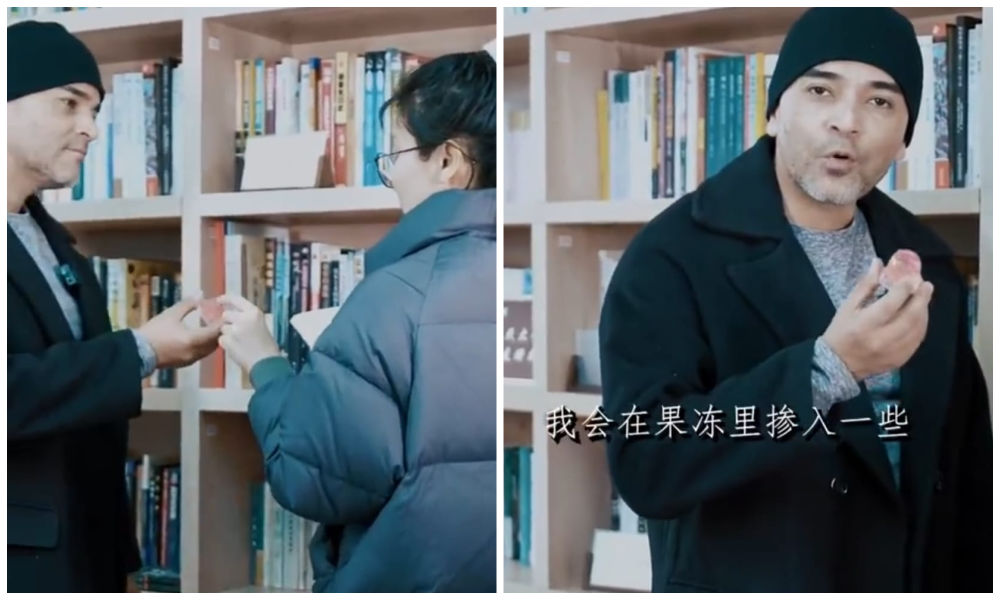
In the final scene, the man is back in the dark room and seems to snort something before turning back to the camera, saying:
“Oh, and don’t send this video to your friends and family. Otherwise, my tactics won’t work..”

“We would almost report him!” some official media accounts wrote about the video.
In recent years, Xinjiang authorities have stepped up their anti-drug publicity campaigns. Besides their social media campaigns, the Xinjiang Anti Drug Office also carries out anti-drug campaigns at schools.

The main actor, who is now a social media hit, appears in multiple videos issued by the Xinjiang authorities (here’s another one).
Some people joke about praising the actor for his acting skills: “I don’t know the difference between the drug lord and the actor anymore.”
“You can only play [the role] this well if you’ve seen a lot of drug dealers,” some commenters suggested.
In light of the actor almost being more popular now than the message the video propagates, many people want to know who he is and what his background is.
“Isn’t he a veteran actor?” some wonder: “What’s his name?”
Although it is not reported at this point who the actor is, some people think he is not a professional but is part of the local anti-drug office team.
It is not uncommon for local anti-drug teams to be creative in their campaigns. In 2020, Hainan’s anti-drug police force published a video of themselves covering Jay Chou’s “Mojito” (link).
Some commenters even suggested that the Xinjiang and Hainan forces join hands in making a new production.
Another campaign that was less popular was one that took place in Guangdong in 2018, when ten households in a local village were publicly shamed by having the words “Drug Crimes in Family” sprayed on their walls or doors (link). Compared to those kinds of publicity campaigns, this Xinjiang one is definitely more popular among Chinese netizens: “He might be a drug lord, but I just think he’s really handsome.”
By Manya Koetse
Get the story behind the hashtag. Subscribe to What’s on Weibo here to receive our newsletter and get access to our latest articles:
Spotted a mistake or want to add something? Please let us know in comments below or email us. First-time commenters, please be patient – we will have to manually approve your comment before it appears.
©2023 Whatsonweibo. All rights reserved. Do not reproduce our content without permission – you can contact us at info@whatsonweibo.com.
Manya is the founder and editor-in-chief of What's on Weibo, offering independent analysis of social trends, online media, and digital culture in China for over a decade. Subscribe to gain access to content, including the Weibo Watch newsletter, which provides deeper insights into the China trends that matter. More about Manya at manyakoetse.com or follow on X.

You may like
China Memes & Viral
Nanchang Crowd Confuses Fan for Knife — Man Kicked Down and Taken Away
An unfortunate misunderstanding led to one innocent man being the only person injured in a crowd of thousands.
Published
1 week agoon
October 5, 2025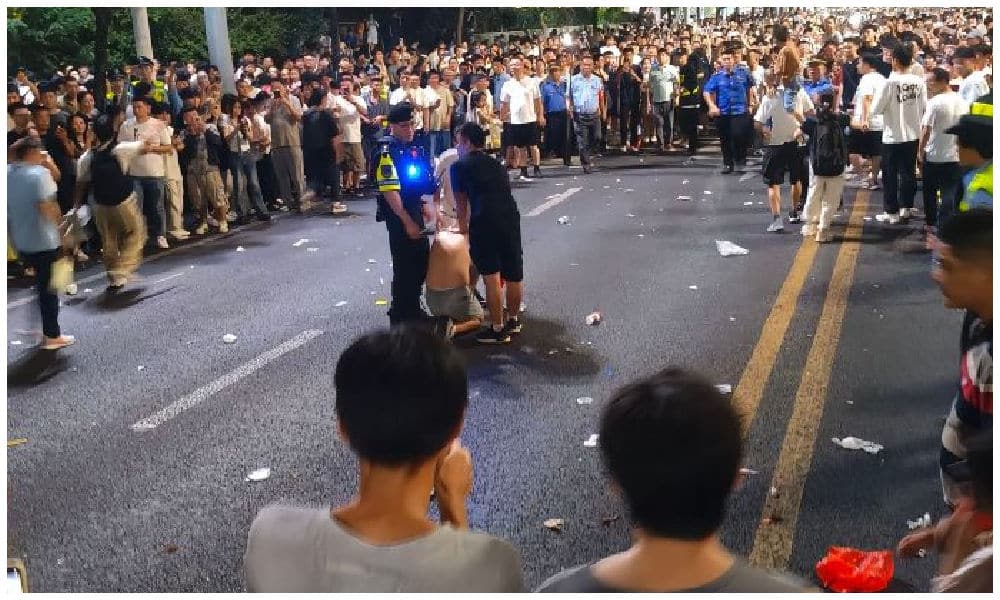
On the evening of October 1st, National Day and the start of a week-long holiday, Nanchang was celebrating with a spectacular fireworks/drone show, drawing an enormous crowd of people (see video).
But the fireworks weren’t the only thing drawing attention. One man on Nanchang’s crowded Shimao Road caught bystanders’ eyes.
He was shirtless, strongly built with a visible tattoo, and was waving a pointed object while loudly shouting something that sounded like, “I’ll kill you! I’ll kill you!”
At first, the people around him seemed unsure of what to do, keeping their distance and too afraid to approach. A large crowd formed but stayed back.
Then, a brave young man in red rushed forward and snatched the pointed object from his hand, while another young man leapt in with a flying kick that knocked him to the ground.
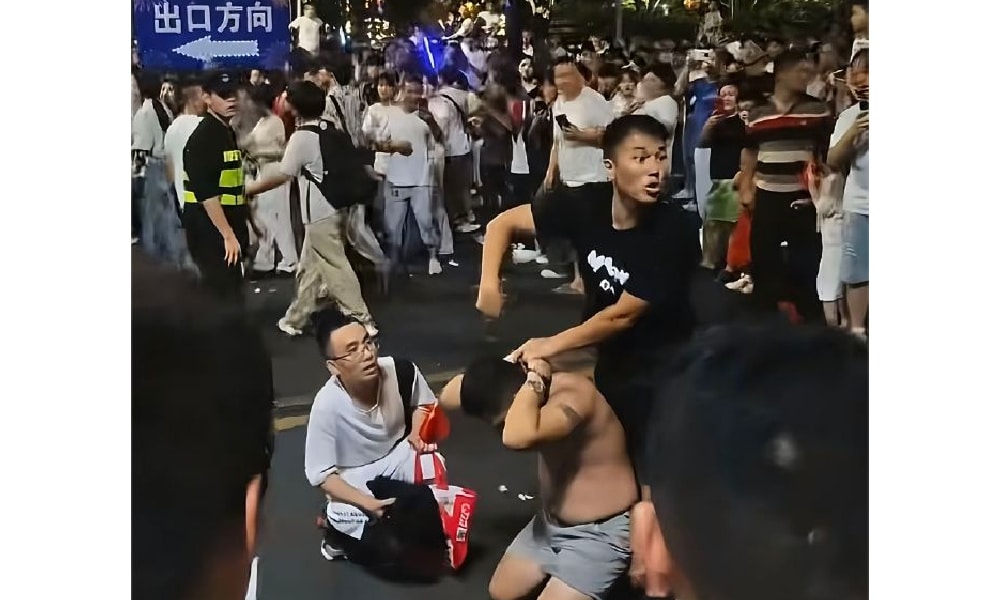
Several others then joined in, working together to restrain the man, as onlookers surrounded the scene and held him there until police arrived and took him to the station.
Soon, videos of the incident spread online (see video here), and rumors quickly surfaced that the man had been trying to attack people with a knife.

But that all turned out to be one major misunderstanding.
The next day, local police clarified what had actually happened, followed by an explanation from the man himself.
The man in question, a 31-year-old local second-hand car dealer named Li, had come to see the fireworks together with his family, including his sisters and three nephews.
Because of the very hot weather, he had taken off his shirt and was cooling himself with a 10-yuan folding fan he had just bought along the way.
After the show, while walking back, Li realized one of his nephews was missing and searched for him, calling out in his local dialect: “Where’s my kid? Where’s my kid?” (“我崽尼 我崽尼” wǒ zǎi ní).
Bystanders misheard this as “我宰你 我宰你” (wǒ zǎi nǐ, wǒ zǎi nǐ, “I’ll kill you, I’ll kill you”) and mistook his folding fan for a machete.
Meanwhile, Li couldn’t understand why people around him were avoiding him and keeping their distance from him while he was searching for his nephew (see that moment here, also see more footage here). People were watching him, and recording the scene from a distance.
Before Li realized what was happening, the fan was snatched from his hands and he was violently kicked. A crowd swarmed him, beat him, and pushed him to the ground.
The police then detained him, and it wasn’t until the early hours of October 2, after thorough questioning, that he was finally released.
“I’m still confused about it,” Li said the next day. Holding the fan up to the camera, he asked: “Can a fan like this really scare people? I don’t understand — I just got beaten for nothing.”
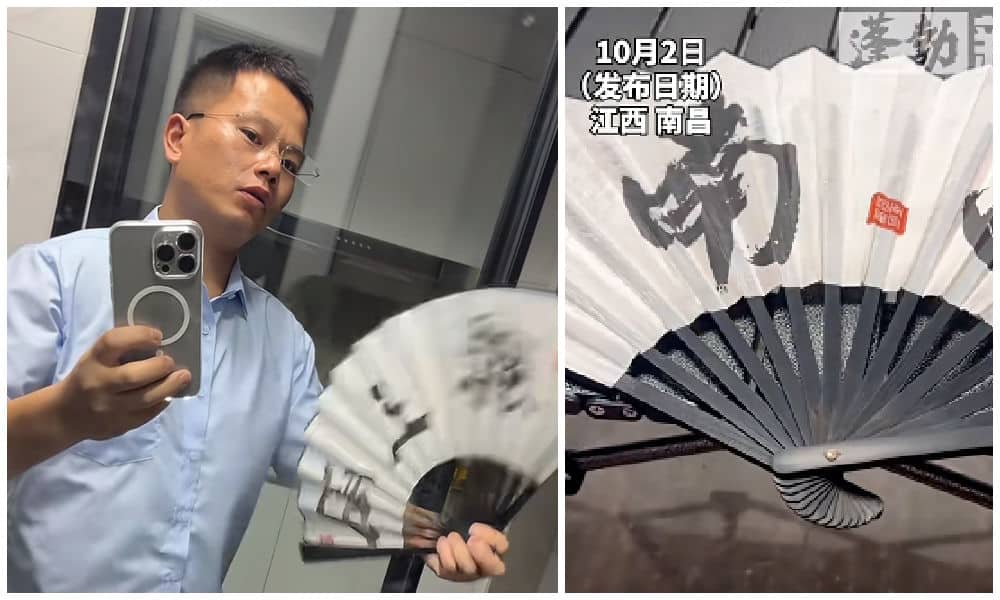
Mr Li in his video, showing the fan he bought for 10RMB/$1.4 at the Nanchang fireworks.
Some commenters remarked that out of the 1.2 million people who were out in Nanchang that night, he was the only one injured.
Li seems to be doing ok apart from a sore backside and a puzzled mind, and his nephew apparently is also safe and well.
The bizarre misunderstanding has sparked widespread banter online, with people now referring to Li as “Nanchang Brother Fan” (南昌扇子哥).
“I’m dying of laughter. It’s both tragic and hilarious,” one Douyin user wrote, while others simply called the situation “so drama” (抓马 zhuāmǎ): “I’m not supposed to laugh, but I can’t help it.”
Some also noted that they understood why people at the scene mistook Li for a criminal: “At night, a guy with tattoos, holding a long stick-like object, shouting loudly all the way, what would you think?”
All joking aside, the public’s response on such a crowded night — when so many people gathered together, potentially making a tempting target for those with bad intentions — shows a heightened sense of vigilance. Unlike the U.S., where gun violence is more common, shootings are rare in China. But random stabbings have increasingly made headlines.
For Nanchang in particular, a stabbing incident that shocked the nation had taken place only weeks earlier: a 19-year-old woman was attacked and stabbed more than ten times by a 23-year-old man she did not know, and later died from her injuries.
But there have also been other recent cases, from Wuhan to Leiyang. And in 2024 especially, a spate of stabbing incidents shocked the country. In Wuxi, Jiangsu Province, a mass stabbing left eight people dead and 17 others injured.
The positive takeaway from this entire mix-up is that the quick action of the crowd — despite their wrong assessment of the situation — shows that people weren’t afraid to step in for the sake of public safety.
But others claim the exact opposite is true. Illustrator and commentator ‘Wu Zhiru’ (吴之如), former editor at Zhenjiang Daily, saw the incident as an example of toxic herd mentality. He posted an illustration of a fan being held up with the characters 清风徐来 (qīng fēng xú lái, “a cool breeze slowly blows”), an idiom to describe a pleasant atmosphere. A finger from the right points at the fan-holder, saying “Look, he’s gonna commit violence!” (“哇,他要行凶啦!”)

Wu Zhiru warns against panic-driven mob mentality and wonders why the first man, who snatched the “knife” from Li’s hands, did not stop the crowd from attacking Li as soon as he discovered that he had snatched away a fan and not a blade. Drawing historical parallels to the Cultural Revolution, Wu argues that people are sometimes so set on doing the “heroic” thing that they hesitate to correct misunderstandings once better information is available — a mindset that can lead to serious, harmful consequences.
For Li himself, despite the unfortunate night he had, the situation has actually brought him some unexpected fame and extra attention for his second-hand car dealership, which undoubtedly makes his boss happy (in a very recent livestream, Li was praised for being kind and loyal).
Many netizens also argued that the real lesson to draw from this ordeal is the importance of speaking proper standard Chinese. Some even framed the incident as “The Importance of Mandarin” (论普通话的重要性), pointing out that the whole problem began because Li was misunderstood while speaking dialect.
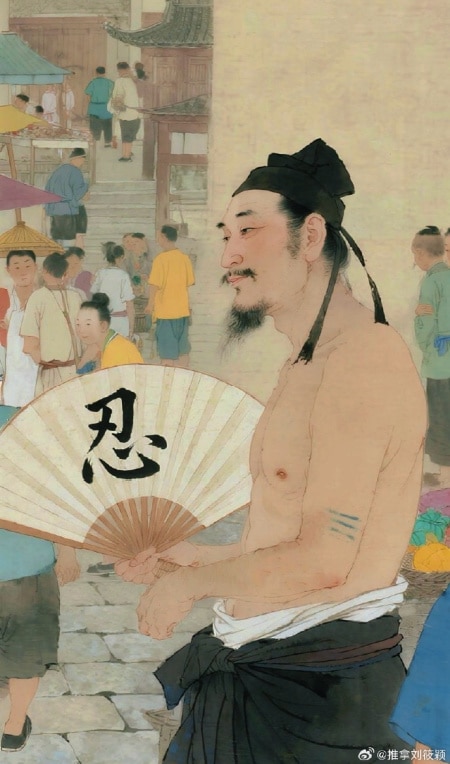
Image posted on Weibo in support of the “fan-waving brother.” The character on the fan says “tolerate.”
Others joked that the misunderstanding was just a grave injustice to shirtless men everywhere, writing: “From now on, the world has one less sincere guy who goes shirtless in the streets. He’ll never be the same again.”
By Manya Koetse
(follow on X, LinkedIn, or Instagram)
Spotted a mistake or want to add something? Please let us know in comments below or email us. First-time commenters, please be patient – we will have to manually approve your comment before it appears.
©2025 Whatsonweibo. All rights reserved. Do not reproduce our content without permission – you can contact us at info@whatsonweibo.com.
China Insight
The Secret Life of Monks: Shi Yongxin’s Shaolin Scandal Casts a Shadow on Monastic Integrity
“To put it bluntly, temples have been places of deception, corruption, opportunism, and exploitation since ancient times.”
Published
3 months agoon
July 28, 2025
This week, news about a well-known Chinese monk going off the Buddhist path has triggered many discussions on Chinese social media.
The story revolves around Shi Yongxin (释永信), the head monk at China’s famous Shaolin Temple (少林寺) in Dengfeng, Henan. Shi is suspected of embezzlement of temple funds and illicit relationships, and is currently under investigation.
In recent days, wild rumors have been circulating online claiming that Shi fled to the United States after being exposed. On July 26, a supposed “police bulletin” began circulating, alleging that Shi Yongxin had attempted to leave the country with seven lovers, 21 children, and six temple staff. It also claimed he was stopped by authorities before exiting China, that he had secretly obtained U.S. citizenship a decade ago, and that he had misused donations and assumed fake identities.
Although that specific report has since been refuted by Chinese official media, it quickly became clear that there was real fire behind all that smoke.

The report that circulated online and was later confirmed to be fake
Because despite all the sensationalized gossip (some posts even claimed Shi had 174 illegitimate children!), what’s certain is that Shi Yongxin seriously crossed the line. On July 27, 2025, the Shaolin Temple Management Office (少林寺管理处) issued an official statement through its verified channels, including its WeChat account. The statement read:
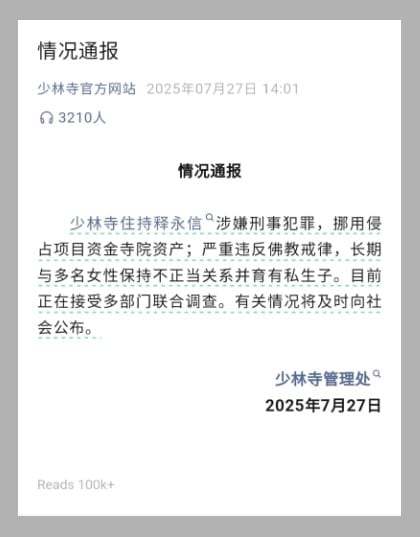
The report that circulated online and was later confirmed to be fake.
Shi Yongxin, the Abbot of Shaolin Temple, is suspected of criminal offenses, including misappropriating and taking project funds and temple assets. He seriously violated Buddhist discipline, maintained improper relationships with multiple women over a long period and fathered illegitimate children. He is currently under joint investigation by multiple departments. Relevant information will be made public in due course.
Shaolin Temple Management Office
July 27, 2025
China’s Buddhist Association (中国佛教协会) also released a statement on July 28, in which it stated that, in coordination with the Henan Provincial Buddhist Association (河南省佛教协会), Shi Yongxin has been officially stripped of his monastic status.
Various Chinese media sources report that Shi Yongxin was taken away by police on Friday, July 25. Chinese media outlet Caixin suggests that it must not have come as a complete surprise, since Shi had allegedly already been restricted from leaving the country since around the Spring Festival period (late January 2025) (#释永信春节前后已被限制出境#).
About Shi Yongxin
Shi Yongxin is not just any abbot. He’s the abbot of the Shaolin Monastery (少林寺), which is one of the most famous Buddhist temples in the world and is known as the birthplace of Shaolin Kung Fu. The temple was founded in 495 CE. Besides being a Buddhist monastery, it also operates as a popular tourist attraction, a kung fu school, and a cultural brand.
Shi has been running the monastery for 38 years, a fact that also went trending on Weibo these days (#释永信已全面主持少林寺38年#, 140 million views by Monday).
Shi Yongxin is the monastic name of Liu Yingcheng (刘应成), born in Yinshang county in Fuyang, Anhui, in 1965. He came to Shaolin Temple in 1981 and became a disciple of abbot Shi Xingzheng (释行正), who passed away in 1987. Shi Yongxin then followed in his footsteps and managed the temple affairs. He formally became head monk in 1999.
Moreover, Shi Yongxin reportedly served as President of the Henan Provincial Buddhist Association since 1998 and as Vice President of the Buddhist Association of China since 2002.

Shi Yongxin, photos via Weibo.
Shi Yongxin was thus an incredibly powerful figure—not only because of the decades he spent overseeing temple affairs, but also due to his influence within public, institutional, and religious spheres.
Holding such a visible role, Shi Yongxin (释永信) also had (or has—though it’s unlikely he’ll ever post again) a Weibo account with over 882,000 followers (@释永信师父). His last post, made on July 24, was a Buddhist text about the ‘Pure Land’ (净土)—a realm said to make the path toward enlightenment easier.
That post has since attracted hundreds of replies. While some devoted followers express disbelief over the scandal, many others respond with cynicism, questioning whether anything about Buddhism remains truly ‘pure.’
One widely shared post shows an artist sitting in front of a painting of Shi Yongxin, writing, “Worked on this painting for six months, just finished late last night—feels like the sky’s collapsed.” The second picture, posted by someone else, says, “Just change it a bit.”

One aspect of the scandal fueling online discussions is the fact that Shi Yongxin had led the monastery for so long. Rumors about his “chaotic private life” and unethical behavior surfaced years ago, going back to at least 2015 (#释永信10年前就曾被举报私生活混乱#; #释永信曾被举报向弟子索要供养钱#). One of the questions now echoing across social media is: why wasn’t he held accountable sooner? “Who was protecting him?”
“The Tip of the Iceberg”
The Shi Yongxin scandal does not just hurt the reputation and cultural brand of the Shaolin Monastery; it also damages a certain image of Buddhist monks as a collective of people with true faith and integrity.
According to well-known knowledge blogger Pingyuan Gongzi Zhao Sheng (@平原公子赵胜), many people’s understanding of abbots or Buddhist masters (“方丈大师们”) is flawed, since it’s generally believed they attained their high positions within the monasteries due to their moral virtue or deep understanding of Buddhism. In reality, Zhao Sheng argues, these individuals often rise to power because they are skilled at earning money and gaining influence.
“To put it bluntly,” Zhao Sheng writes, “temples have been places of deception, corruption, opportunism, and exploitation since ancient times.”
The blogger argues that much of the influence and power of Buddhist masters was stripped away under Mao Zedong, but that some new famous monks rose in the 1980s, using their skills and connections to rebuild temples and turn them into thriving enterprises.
“If you want to find a few people in temples who truly have faith, who truly have personal integrity, and who are truly dedicated to saving all living things, it’s not that they don’t exist—but it’s rather difficult, like finding a needle in a haystack,” Zhao Sheng wrote.
Some commenters suggest that Shi Yongxin is just the tip of the iceberg (“冰山一角”). They believe that if someone as influential as him can be involved in such misconduct—despite whistleblowers having tried to expose him for over a decade—there must be many more cases of power abuse and corruption within China’s monasteries.
“I previously donated money to the temple,” one commenter on Xiaohongshu wrote: “Although it wasn’t much, it does make me a bit uncomfortable now.”
Another person posted that the Shi Yongxin scandal gave them a sense of despair.
Some older posts about the extravagant lifestyles of head monks — including their luxury cars — have also resurfaced online and are once again making the rounds, suggesting that netizens are actively revisiting other potential instances of misconduct within the monastic world.

Abbot Guangquan Fashi (光泉法师) with a Ferrari California T, Kaihao Fashi (开豪法师) with a Porsche Panamera, Shi Yongxin (释永信) linked to an Audi Q7, and Huiqing (慧庆) and a BMW 7 Series.
One image that resurfaced online shows Shi Yongxin—allegedly driving an Audi Q7—alongside other abbots, such as Guangquan Fashi (光泉法师), the head monk of Lingyin Temple (灵隐寺), who is associated with a Ferrari.
More images like these are now circulating, as people delve into the ‘secret lives of monks’ beyond the spiritual, shifting focus to their material lives instead.

Monks from major temples, including Qin Shangshi (钦尚师) of Famen Temple, E’erdeni (鄂尔德尼) of Jokhang Temple in Lhasa, Yin Le (印乐) of Baima Temple, and Huiqing (慧庆) of Baishou Temple, are rumored to be associated with high-end cars like BMWs, a Porsche Cayenne, and a Range Rover.
While the results of the investigation into Shi Yongxin are still pending, many netizens are already looking beyond him. One person writes: “Are you realizing now? It’s not just Shaolin Temple that has money, other temples aren’t exactly short on money either.”
Another person wonders: “Are the monks in today’s temples actually still truly devoted to spiritual practice at all?”
By Manya Koetse
(follow on X, LinkedIn, or Instagram)
Spotted a mistake or want to add something? Please let us know in comments below or email us. First-time commenters, please be patient – we will have to manually approve your comment before it appears.
©2025 Whatsonweibo. All rights reserved. Do not reproduce our content without permission – you can contact us at info@whatsonweibo.com.
Subscribe
What’s on Weibo is a reader-supported publication, run by Manya Koetse (@manyapan), offering independent analysis of social trends in China for over a decade. To receive new posts and support our work, consider becoming a paid subscriber.

Get in touch
Would you like to become a contributor, or do you have any tips or suggestions? Get in touch here!

From Tents to ‘Tangping Travel”: New Travel Trends among Young Chinese

House of Wahaha: Zong Fuli Resigns

How the “Nexperia Incident” Became a Mirror of China–Europe Tensions

China Faces Unprecedented Donkey Shortage Crisis

Nanchang Crowd Confuses Fan for Knife — Man Kicked Down and Taken Away

Hidden Cameras and Taboo Topics: The Many Layers of the “Nanjing Sister Hong” Scandal

“Jiangyou Bullying Incident”: From Online Outrage to Offline Protest

The Rising Online Movement for Smoke-Free Public Spaces in China

China Trend Watch: Pagoda Fruit Backlash, Tiananmen Parade Drill & Alipay Outage (Aug 11–12)

From Schadenfreude to Sympathy: Chinese Online Reactions to Charlie Kirk Shooting
Popular Reads
-

 China Memes & Viral3 months ago
China Memes & Viral3 months agoHidden Cameras and Taboo Topics: The Many Layers of the “Nanjing Sister Hong” Scandal
-

 China Books & Literature12 months ago
China Books & Literature12 months agoThe Price of Writing Smut: Inside China’s Crackdown on Erotic Fiction
-

 China Insight5 months ago
China Insight5 months agoUnderstanding the Dr. Xiao Medical Scandal
-

 China Memes & Viral10 months ago
China Memes & Viral10 months agoOur Picks: Top 10 Chinese Buzzwords and Phrases of 2024 Explained



